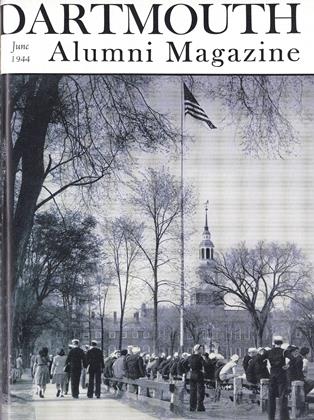by Hadley Cantril '28. Princeton University Press, 1944. 318 xiv pp. $3.7.5.
"What I want," Abraham Lincoln is reported to have said, "is to get done what the people desire to have done, and the question for me is how to find that out exactly." The Great Emancipator was speaking without benefit of Gallup Poll and similar agencies of public opinion reporting, which have played an increasingly important, although not completely understood, role in national affairs. This book is the most inclusive investigation by a social scientist into the nature and problems of conducting public opinion polls that has yet appeared.
As Director of the Office of Public Opinion Research at Princeton University, Professor Cantril is in a unique position to assay the growing volume of public opinion research undertaken during the past decade by business organizations, newspaper and magazine publishers, and academic investigators. Some of the problems he discusses in this volume deal with the difficulties that confront the investigator in the process of posing basic issues; whether or not the questions to be asked are both comprehensible and meaningful; to what extent the preconceptions of the interviewers influence the opinions they are supposed to report; how the investigator goes about choosing a "representative sample" of the population, a point at which the late Literary Digest poll went so completely astray; and how the raw data taken from the poll can be interpreted as expressing the basic attitudes of the population as a whole.
This book will be of primary interest to the special public of persons who interest themselves professionally or commercially in the study of public opinion. It will also be of interest to the conscientious citizen who wishes to keep informed of the basic trends in the study of what makes democracy work.
 View Full Issue
View Full Issue
More From This Issue
-
 Lettter from the Editor
Lettter from the EditorRound the Girdled Earth
June 1944 -
 Article
ArticleLaureled Sons of Dartmouth
June 1944 By H. F. W. -
 Class Notes
Class Notes1943
June 1944 By EDWIN A. BOCK, WILLIAM T. MAECK -
 Article
ArticleDARTMOUTH'S SKIPPER
June 1944 By HERBERT W. HILL -
 Class Notes
Class Notes1917
June 1944 By MOTT D. BROWN JR., DONALD BROOKS -
 Class Notes
Class Notes1918
June 1944 By ERNEST H. EARLEY, DONALD L. BARR
Francis E. Merrill '26
-
 Sports
SportsMISCELLANY
November 1948 By Francis E. Merrill '26 -
 Sports
SportsCORNELL 27, DARTMOUTH 26
December 1948 By Francis E. Merrill '26 -
 Sports
SportsTennis
May 1951 By Francis E. Merrill '26 -
 Sports
SportsFall Results
December 1951 By Francis E. Merrill '26 -
 Sports
SportsBasketball
February 1952 By FRANCIS E. MERRILL '26 -
 Sports
SportsTennis
June 1952 By Francis E. Merrill '26
Books
-
 Books
BooksTHE JAZZ AGE.
April 1960 -
 Books
BooksPROPAGANDA-ITS PSYCHOLOGY AND TECHNIQUE
February 1936 By Henry S. Odbert '30 -
 Books
BooksA DARTMOUTH READER.
MARCH 1970 By HERBERT W. HILL, A.M. '41 -
 Books
BooksStatistical Methods Applied to Education
February 1918 By J. L. M. -
 Books
BooksTHE CUBAN CRISIS OF 1962: SELECTED DOCUMENTS AND CHRONOLOGY.
JUNE 1964 By KALMAN H. SILVERT -
 Books
BooksARROWS OF LIGHT
May 1935 By William H. Wood

